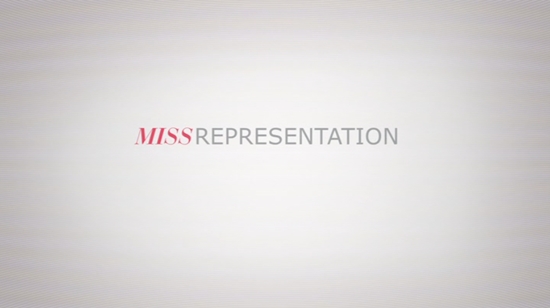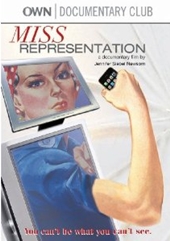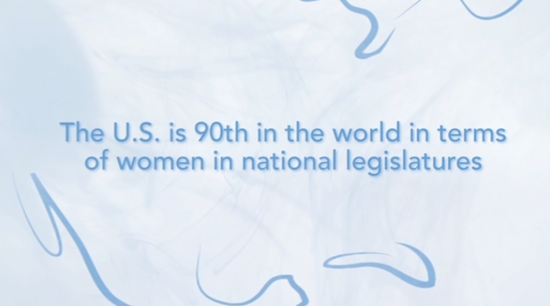
 BUY FROM AMAZON: CLICK HERE!
BUY FROM AMAZON: CLICK HERE!
MSRP $19.99
RATED NR
STUDIO Girls’ Club Entertainment
RUNNING TIME 85 minutes
SPECIAL FEATURES
• None. Zip. Nada
The Pitch
Directed by actress-turned-filmmaker Jennifer Siebel Newsom. A critical look at how the media depicts women, and how these depictions contribute to a culture that continues to stifle females in ways both large and small.
The Humans
Gloria Steinem, Nancy Pelosi, Condoleezza Rice, Katie Couric, Rachel Maddow, Geena Davis, Cory Booker, Gavin Newsom, Lisa Ling, Paul Haggis, Margaret Cho, many more actors, politicians, and social scientists.
The Nutshell
Let’s face it: women get the short shrift in our society. Gender parity is still pretty far off, and this documentary shows how our movies, TV shows, advertising, and music shape this reality.

“Mmm-hmm… what kind of gaze again? Sorry, wasn’t paying attention.”
The Lowdown
I dream of a future where media literacy is a required subject for all students, starting in grade school. But for now, we are woefully unequipped for dealing with our entertainment in any way beyond the surface. Which is a problem, since art acts most significantly on a subconscious level. We don’t think about what we watch or read or hear, and thus not enough people demand more of the media. Consequently, the media gives us nothing worth demanding.
Movies, television, news, and advertising all affect the way we think. It’s a process that begins at birth and continues to the grave. Denying this is not just ignorant, but foolhardy. We are bombarded with thousands of messages every day. Little by little, each of these messages strike dinks in our perceptions. These messages show children how the world works, tell us what is and isn’t important in the world.
And these messages are, for the most part, sent by people who care only about one thing: the money in your pocket. The way they affect the culture matters very little to them. They hold a frightening power in their hands, yet wield it for the most crude, artless purpose possible. True, good and great art sometimes springs from this environment, but it’s almost by accident.
Now, all this Media Studies 101 rambling is to make this one point: when you resort to pushing the laziest, most base message possible, you will only enforce the status quo. And this is a problem because the status quo is extremely loaded against people who aren’t straight white males. Things have to change, but our media encourages a static culture. Miss Representation is all about how this phenomenon holds back progress when it comes to women.
Women are half of our population, yet occupy an extreme minority in most positions of the workforce and government. There are no (or at least there are far fewer) legislative obstacles to equality, yet progress for women in America hasn’t just stalled but reversed in recent decades. Roughly the same number of young boys and girls want to be president when they grow up. By the time those same children reach adolescence, that number has dwindled to almost nothing among females. So what happens in this interim?

You can’t be what you can’t see.
That’s the documentary’s mission statement. In film, television, and advertising, women have a select few number of roles to choose from, whereas men can be anything they want. In a movie, a woman can be the love interest, but rarely the protagonist. If she does get to be the protagonist, she is likely in a romantic comedy, where her goal is to get a man. A man of any age can find a role for himself in Hollywood, but there is a very narrow age range where women are actively sought out (when they’re most “desirable”), and after that period, good luck breaking in!
And that’s not even getting into the endless reams of sexually objectifying advertising, or the uphill, nay, upmountain battle that women face if they want to get into politics. The doc is damning on all fronts, parading a seemingly endless line of sobering statistics, embarrassing images, and anger-inducing stories. To list all the upsetting facts and figures this movie has to offer would take an article of its own.
Really, though, what the doc is getting at is simple: the media is telling our girls and women that there are a select few roles for them in life, and that this in turn becomes a self-fulfilling prophecy, as girls go on to have no ambition for themselves. You can’t be what you can’t see.

‘Murica
The movie is not a “think of the children” wail, though. Far from it. It’s measured and reasonable and backs up all of its claims with fact. It has its agenda (like every documentary ever, and don’t fool yourself otherwise), and it makes its case in a compelling manner. Stylistically speaking, there’s nothing remarkable about it. It follows pretty much every tried-and-true method of doc storytelling in its composition, moving on a topic-by-topic basis through its larger issue. The only big “flaw” in the movie is that director Jennifer Siebel Newsom’s narration is bad. Like, really bad. Often the worse that can be said for narration is that it’s perhaps unmemorable, but Siebel has a terribly flat delivery that makes her sound lobotomized. It’s not really an issue though, since most of the talking is left to the experts.
And what a cast of experts it is! There’s a murderer’s row of extremely smart women (and a few men, too) lending their voices here. It’s much more visceral to hear about the nasty gender-based attacks launched against House Speaker Pelosi when the anecdote comes from Pelosi herself. In fact, beyond offering up statistics, most of these people have a personal stake in this subject. It’s that touch that gives Miss Representation a punch, just as much as the upsetting issue at hand.
The doc is stylistically flat, dogged by its bad narration, and suffers a bit from “would you like to know more” syndrome. It feels like the beginning of a conversation, rather than a complete work unto itself. Indeed, the movie’s website continues to actively work to advocate gender equality and fair representation more than a year after its release, so perhaps it was only ever intended as a start. That makes it suffer somewhat as its own movie, though. But those problems aside, Miss Representation represents (sorry) the best that issue-focused documentary filmmaking can offer. It’s smart, absorbing, and truly important.

He’s got ‘em pegged. Andrea Yates protested for equal pay, don’cha know.
The Package
The DVD I received didn’t even have a top menu. My research seems to indicate that no standard copy of the film has any special features, either. In order to dig deeper into any of the topics the film discusses, you’ll have to check out the educational version of the movie. In other words, you’ll never see any of it, since educational DVD’s are obscenely expensive. The film is basically made to be a rental, anyway. It’s a great one-and-done.
Rating: 




Out of a Possible 5 Stars